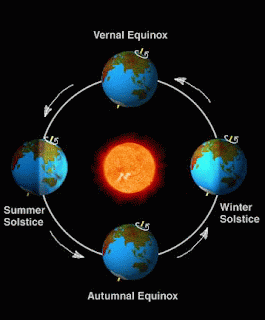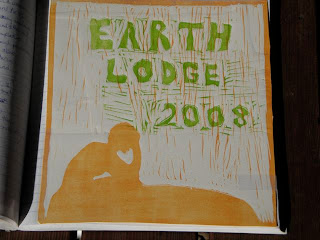
When we think about it, for most of human history Nature has been our "classroom" where we learned and developed as a species. Our ancient clocks were to be found in sun, seasons, solstices and equinoxes, and thus we lived our lives at a more "natural" pace. Until the Industrial Revolution and consequent urbanization, education involved significant time spent outdoors in a variety of activities depending on social class. Farming, hunting, working with animals, martial arts and exploration would engage all of our senses and require a complex array of embodied intelligences.
As changes in technology caused massive demographic shifts, rural workers displaced by new agricultural technologies, moved from open fields to factories in cities rigidly controlled by the ubiquitous but nearly subconscious clock.




"hurry up please,
it's time!"
Naturally, with such massive socioeconomic changes it would be reasonable and necessary to deploy some kind of organizational plan to encourage smooth social interaction, but the priorities of industry came to dominate the worker and the landscape as factory life and home life became increasingly Taylorized and our lives became gradually infused with measurement in the name of an unquestioned "efficiency."
 In one of the film-texts we discuss over the semester, the 1936 semi-silent classic film Modern Times in which Charlie Chaplin creates a hilarious (sometimes horrific) exploration of the impact of technology on the body of the worker. Though the film could have had full sound, Chaplin significantly chose to give voice only to certain "characters," a touch pregnant with relevance for today. The link above contains the whole movie and the first 15 minutes is worth a peek, but the whole movie should be seen on full-size DVD for best results. Though EARTH Lodge emphasizes the necessity of outdoor education, when in class we also engage with a variety of Web 2.0 technologies both as critical viewers and thoughtful creators rather than merely passive consumers of web content. This blog is an example of the variety of our explorations and one example of the media we use.
In one of the film-texts we discuss over the semester, the 1936 semi-silent classic film Modern Times in which Charlie Chaplin creates a hilarious (sometimes horrific) exploration of the impact of technology on the body of the worker. Though the film could have had full sound, Chaplin significantly chose to give voice only to certain "characters," a touch pregnant with relevance for today. The link above contains the whole movie and the first 15 minutes is worth a peek, but the whole movie should be seen on full-size DVD for best results. Though EARTH Lodge emphasizes the necessity of outdoor education, when in class we also engage with a variety of Web 2.0 technologies both as critical viewers and thoughtful creators rather than merely passive consumers of web content. This blog is an example of the variety of our explorations and one example of the media we use.
Today, though many progressive teachers are breaking old patterns and deploying new ones, the impact of the Industrial Revolution still echoes in our emphasis on tightly scheduled clock time, obsessive productivity and rigidly arranged classrooms with rows of desks all facing forward, facing the sole source of authoritative information. This is not an arrangement that encourages engagement or honors the knowledge brought by the student. Often this arrangement can stifle creativity and promote passivity.
This is the limited model EARTH Lodge seeks to transcend.
There may or may not be such a thing as Nature Deficit Disorder, but it's not hard to see how disconnected we are becoming from Nature since most of us cannot build a fire, construct a shelter or grow our own food as our ancestors have done for most of human history. It may be worthwhile reconsidering whether our current relationship to technology enhances or detracts from our evolutionary potential. If adaptation is the crucial behavior for survival and evolution, are we becoming more able to adapt?
These are some of the questions, ideas and issues we explore in our American Literature course "Natural Reflections in Fiction and Nonfiction" where we examine a variety of texts in terms of their literary qualities as well as their contribution to our reflections about humanity and our relationship to nature and technology. These readings and discussions are enhanced by outdoor activities and other events specifically planned and executed by Lodge members.
We have had City Naturalist Ralph White come to speak to us about the significance of the geology of the falls of the James River and the importance of grassroots involvement in the parks. In the second semester of the EARTH Lodge year we work on projects througout Richmond's 500+ acre James River Park System. Sometimes we meet for class down by the river, or take a dip on a hot day after classes. The nearby Pony Pasture Park section is 130 acres of riparian woodland that is home to deer, fox, raccoon, beaver, turtles, squirrels, possum and dozens of species of birds. To the close observer, the area is full of intriguing signs and information relevant to our readings...and our other courses!
swimming, fishing, boating, birdwatching...


remnants of a meal??


can you spot the
paw-paw fruit in
the leaves below?
EARTH Lodge begins the semester on the Friday before classes start with a pre-semester retreat to learn new skills, get to know each other and discuss our readings for the course. The 2008 crew rented a CCC cabin at Doyles River in Shenandoah National Park and discovered just how comfortable life can be in the absence of modern technologies....well, except for the outhouse - now that was heinous!


Note: EARTH Lodge is not for everyone and it may not be for you if you:
*only want to be in Lakeview but don't care about the Lodge
*are over-scheduled so you cannot make most of the trips
*are not interested in forming community
*are resistant to regular outdoor experiences
*prefer to take direction than initiative
*dislike being challenged intellectually, socially and physically
If you're interested in learning more, come join me for a Fire Circle at "Owl's Nest" on Friday 2/13 6-7PM. We're at 7313 Longview Drive just above Pony Pasture. Cross Huguenot, take 1st right after bridge and turn Right on to Riverside Dr.
Continue past Pony Pasture parking lot (on left) and bear Right at Yeild sign to take the next Left on to Longview Drive. We're at the crest of the hill on the right, past Longview Ct.
Look for the Spider flag.
Hope to see you there!
(hot drinks will be provided)






